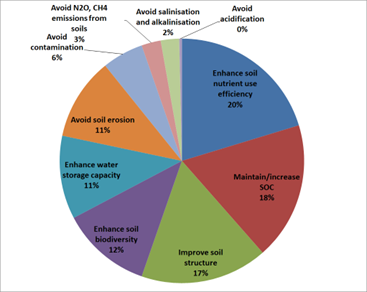EJP SOIL Tackles the Challenge of Sustainable Soil Management
In a quest to rejuvenate Europe’s ailing soils, EJP SOIL researchers unearth critical knowledge gaps in sustainable soil management practices, spotlighting areas crucial for climate-smart agriculture and environmental resilience.


In the face of global challenges, the health of our soil is more crucial than ever, serving as the bedrock of agriculture, climate stability, and ultimately, human survival. The European Journal of Soil Science recently published a study by researchers in the EJP SOIL consortium, revealing significant knowledge gaps in our understanding of the impacts of sustainable soil management practices across Europe.
This pivotal research by an international group of soil scientists lead by Ana Marta Paz from the National Institute of Agricultural and Veterinary Research in Portugal, underscores the pressing need for an enhanced grasp of soil management's impacts, critical for drafting effective research and policy strategies aimed at combating soil degradation.
The Soil Dilemma: A Continental Concern
With 60-70% of European soils estimated to be in an unhealthy state, the stakes for reversing soil degradation have never been higher. This degradation not only threatens sustainable development but also poses a dire risk to food security and biodiversity.
The question arises: Is the current state of European soils due to a lack of knowledge dissemination, insufficient incentives for the adoption of sustainable practices, or a fundamental gap in our understanding of these practices and their impacts?
Bridging the Knowledge Gap
To tackle these questions, EJP SOIL embarked on a comprehensive survey, pooling data from 23 European countries to map out the existing landscape of agricultural soil management knowledge.
Through national scientific databases, knowledge repositories, and stakeholder engagements, the consortium sought to pinpoint where our understanding falls short. The survey's findings are clear: significant gaps remain, particularly in areas crucial for climate change mitigation and adaptation.
Key Areas for Immediate Attention
The study highlights three areas where our knowledge is lacking:
- The Complex Web of Greenhouse Gas Emissions: There's an urgent need for more research on practices that mitigate N2O and CH4 emissions from agricultural soils. The few existing studies highlight the complexity and context-dependency of these emissions. This complexity means that the actual emissions of a soil will be different depending on the specific site and its local conditions.
- Tillage Practices and Carbon Storage: How does tillage affect carbon storage in both the topsoil and deeper layers? The current consensus on the impact of tillage practices on long-term carbon storage is fragmented, pointing to a critical need for a deeper investigation into the soil's vertical carbon dynamics.
- Combatting Desertification: With desertification posing an increasing threat across various European contexts, there's a noticeable scarcity of studies adopting an integrated approach to understanding the degradation processes involved.
A Roadmap for the Future
These findings from the EJP SOIL consortium serve as a clarion call for targeted research efforts and enhanced knowledge dissemination strategies. By addressing these knowledge gaps, Europe can advance towards climate-smart agricultural soil management, ensuring the health and productivity of its soils for generations to come.
As we move forward, the EJP SOIL consortium's work will undoubtedly play a pivotal role in shaping the future of European agriculture and its response to the global climate crisis.
…
Full study is available at: https://doi.org/10.1111/ejss.13468
Contact: Ana Marta Paz: ana.paz@iniav.pt from the National Institute of Agricultural and Veterinary Research, Portugal.